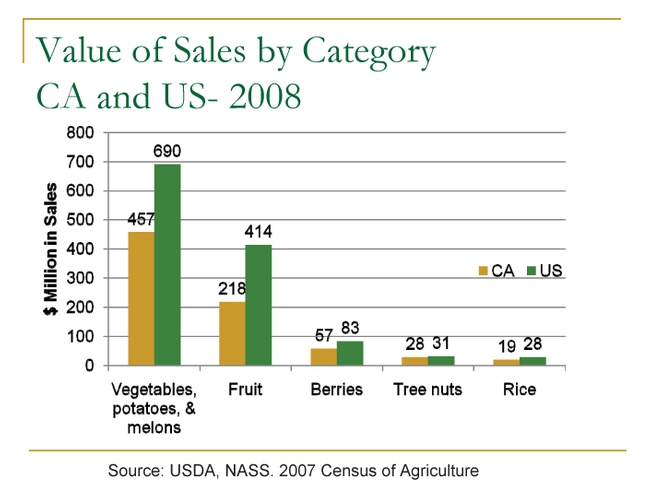
Tips for growing, selling organic
California growers considering organic certification were able to hear about the value of doing so — and tips for getting started — from a farmer, buyer and agricultural economist at one of the California Small Farm Conference workshops.
“I had about a thousand customers per week at the farmers market, pulling up my carrots and saying, ‘Are these organic?’ And I got tired of that question,” said farmer Phil McGrath, about one of the many reasons he chose to grow organically.
McGrath and a produce buyer he works with both talked about the importance of “telling your production story” as a marketing tool, and said having the certified-organic label helped.
“We feel that it’s easy for consumers to wrap their heads around ‘organic.’ They think they know what it means,” said Karen Beverlin, vice president of specialty sales for FreshPoint. “The labels give us something to hang on [McGrath] and his product, but then it's up to us to tell the story of how that's so different.”
One of the things that sets McGrath apart from some other farmers is his emphasis on diversified farming. His main piece of advice for budding organic farmers is growing organically is easier on a diversified farm. McGrath Family Farms grows mixed vegetables, strawberries, heirloom tomatoes, pumpkins and cover crops.
“If you're going to be an organic farmer, it's hard to grow just one thing,” he said. “It’s a kick to be this diversified – it really does make you a stronger farmer. I grow more things in season, I use a normal amount of water and I’ve stabilized my labor demands. I have very few pest problems; probably my first [main pest] would be birds, next would be mammals.”
Karen Klonsky, UC Cooperative Extension agricultural economist at UC Davis, explained the basics of organic certification and the organic market.
“California dominates organic production nationwide,” she said.

Organic production includes following USDA’s National Organic Program, with no prohibited substances for at least three years — including synthetic substances not on the national list, genetic engineering and sewage sludge. Farmers selling more than $5,000 per year must be certified to call their produce organic. The process to get certified involves preparing an organic system plan, recordkeeping and an annual inspection. Klonsky explained that there are 25 USDA accredited certifiers active in California.
“All of the rules being followed are the same by any certifier,” she said. “How they do differ is whether they’re nonprofit, for-profit, a government agency, etc.”
Though costs and fee structures vary, all of the certifiers charge for the application, inspection and certification. Some certifiers also have trade associations, play political roles, offer educational programs or have specialized services and expertise.
Klonsky said that growers should plan for the certification process to take 8-12 weeks, though many certifiers offer expedited programs at an additional cost.
“That's something to ask a certifier: Once I get you my paperwork, how soon until you'll visit my farm and I'll be certified?” Klonsky said.
The certifier’s inspection will review and verify your farm’s organic system plan (OSP), with a facility tour including any storage and processing, all records pertaining to organic production and practices and an audit trail with a balance of inputs and outputs.
Klonsky recommends setting aside time, work space and relevant staff members for the inspection. Any changes to labels or systems should be submitted to the certifier prior to the inspection, to save time and confusion. (View Klonsky's presentation and others from the conference.)
Resources recommended by Klonsky:
- ATTRA, the National Sustainable Agriculture Information Service provides information for organic production, marketing, databases, and certification information
- The Organic Trade Association works with U.S. organic industry to support and grow organic.
- The National Organic Program has monthly reports, policy updates, list of U.S. certifiers
- CDFA Organic Program has information on registration, cost share for certification and accredited certifiers in California
- Organic Materials Review Institute (OMRI) is the U.S. gold standard for materials review and information
Back to the newsletter: Find more Small Farm News articles from our Vol 1. 2012 edition.
